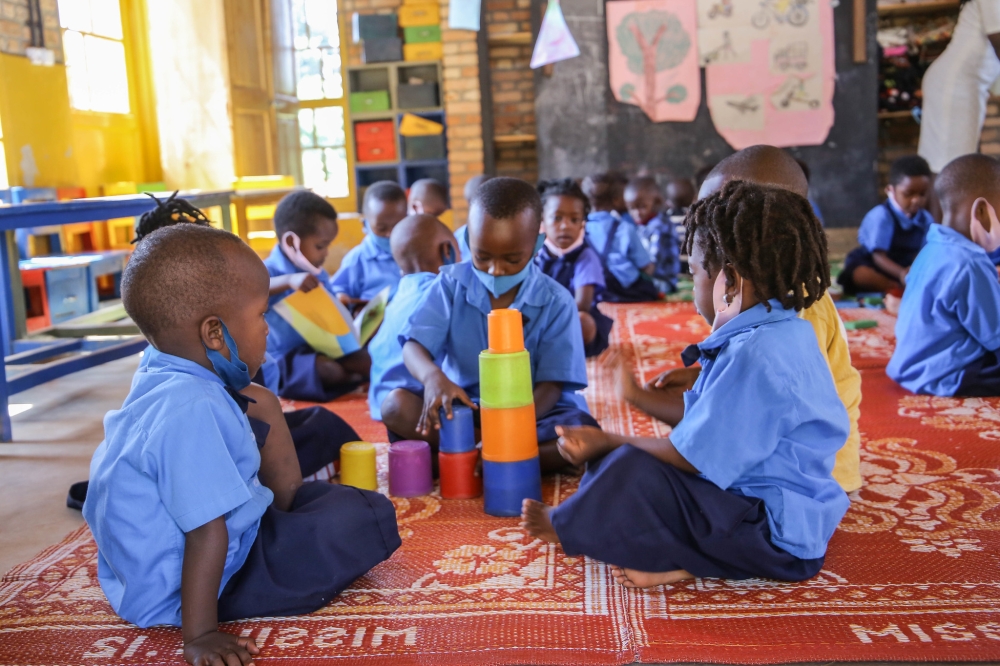

Although there has been significant progress in expanding Early Childhood Development (ECD) services across Rwanda, 22 per cent of the children still lack access to these crucial programs.
As the government intensifies efforts to bridge this gap, stakeholders are exploring ways to address the challenges and ensure that every child benefits from quality early education and care.
According to Gilbert Munyemana, Deputy Director of the National Child Development Agency (NCDA), only 256,677 Rwandan children, (17 per cent) of the total, accessed Early Childhood Development (ECD) services through primary schools in 2018.
However, with the introduction of community-based and home-based ECD centers, coverage has significantly expanded, reaching 78 per cent or 1,149,699 children by 2024.
ALSO READ: How ECDs, mothers’ rooms are improving working conditions, children’s wellbeing
At the Advancing Sustainable Early Childhood Development conference on August 19, key challenges were highlighted, one of them being to ensure inclusivity in Early Childhood Development (ECD) settings, particularly for children with disabilities.
"While many ECD centers have been established, there is a significant need to make these centers fully inclusive. This issue is particularly pronounced in home-based ECD settings, where facilities often lack the necessary accommodation for children with disabilities.
The government, in collaboration with partners and relevant institutions, is actively working to address this gap and create more inclusive environments for all children,” he said.
"Data collection and utilization are also crucial areas requiring enhancement. Previously, there was a lack of comprehensive data on ECD centers, including their quality in terms of infrastructure, washrooms, and surroundings. This gap in information made it challenging to assess and address the specific needs of different regions effectively.”
ALSO READ: Childcare services shine a ray of hope on mining sector
However, the completion of the ECD mapping project has provided valuable insights into the geographical distribution, standards, and infrastructure of ECD centers across the country.
This data will be shared with district and sector leaders to guide decision-making and ensure that all areas meet the required standards.
Another significant gap identified is the shortage of play materials and toys in ECD centers.
"Play is essential for early childhood development, yet many centers lack sufficient or suitable toys. The government is advocating for the use of locally made toys and highlights the importance of parental involvement in play. This not only supports learning but also strengthens the bond between parents and children,” said Munyemana.
Regarding the quality of services at ECD centers, which was also another issue highlighted, the government is dedicated to ensuring that all centers adhere to established standards.
While the objective is not to shut down centers, those that do not meet critical health and safety requirements, such as proper sanitation facilities, may face temporary closure until they achieve compliance.
ALSO READ: MPs push for ECDs at workplaces
This process is being carried out in collaboration with local government authorities, and efforts are ongoing to improve the overall quality of services offered at ECD centers.
Another challenge relates to under trained caregivers who receive little to no compensation.
The government, in collaboration with stakeholders, is working to address these challenges to close the remaining 2 per cent gap in ECD coverage.
"One of the primary issues identified is the capacity and qualification of caregivers. In many community and home-based ECDs, caregivers are not compensated, relying solely on their goodwill.
This has led to a lack of understanding among parents that these caregivers, who often volunteer their services, still need resources to provide for the children's basic needs,” said Mireille Batamuliza, the permanent secretary at the Ministry of Gender and Family Promotion (MIGEPROF).
"The government is urging parents to contribute, whether financially or through agricultural produce, to support these caregivers more as a sign of appreciation.”
Additionally, the lack of formal training remains a significant concern, with only 35,712 out of 101,809 caregivers having received adequate training.
"We are glad that we brought together all stakeholders, as we want to make sure every player plays his or her part in a qualitative way, and we try to meet the 22 per cent that we are missing to achieve 100 per cent, identifying the gaps was the first step and now we must see how we can tackle it together.”
Community involvement is seen as a cornerstone of these efforts. Parents are being urged to take an active role in their children’s early development, both at home and in ECD centers.
This includes providing quality nutrition, ensuring access to clean water and sanitation, and actively participating in their children's early education.
ALSO READ: Gicumbi, Nyagatare districts to get more ECD centres under new project
"We want parents to understand that they are the primary caregivers and educators of their children. Investing in early childhood development is not just an obligation but the best investment they can make for their child’s future,” said Munyemana.
As Rwanda continues its drive towards universal access to Early Childhood Development (ECD) services, the government remains committed to overcoming the remaining challenges to ensure that all children, regardless of their location or abilities, have the opportunity to thrive in their formative years.
With a vision of building a foundation for a healthier, more educated, and prosperous future for all Rwandan children, a recent conference brought together 350 stakeholders to assess progress, identify gaps, and renew commitments to providing high-quality ECD services that shape the nation’s future generations.
"The importance of ECD services cannot be overstated, as these early years are crucial for a child’s brain development, with up to 80 per cent of brain growth occurring during this period. Ensuring that children receive quality nutrition, healthcare, and early education is vital for their future success,” said Munyemana.


